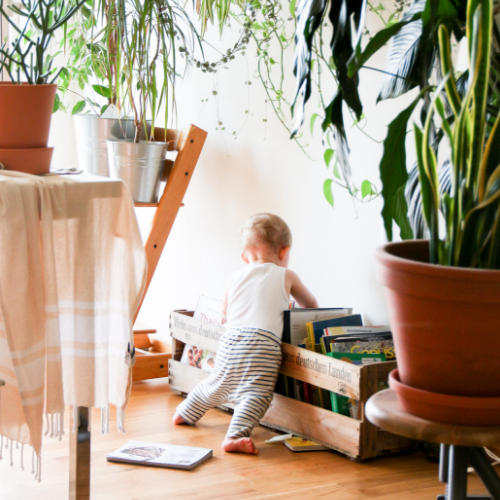Pssst…if you like this post, will you share it on Facebook and Pinterest? Thanks!

You know the place. It’s a white farmhouse in horse country. It’s a loved-in apartment in a blue-collar borough. It’s a low-slung ranch built when this noisy street was the edge of nowhere. It’s the place where you’re always welcome and good memories age even better. Not just a house. A sanctuary.
A home that’s a true haven, a sanctuary, is a place you feel with your heart as well as where you hang your bathrobe. Its walls wrap you in safety. Its doors pull you inside but shut out the hum of the every day world. A sanctuary home is where you’re love, protected, and free to be yourself.
A sanctuary home doesn’t just happen – it’s created.
Everyone needs a sanctuary from the pressures of life outside our four walls. You need it. Your kids need it. Your husband needs it. And if you’re a single mom, then it’s even more important.
Our homes should give us a taste of God’s deep love for us. It’s a foreshadowing of Jesus’s open arms waiting for us on the Day we step into eternity.
If you grew up in a “sanctuary home,” then you want to recreate it for your own family. If you didn’t, then you can start now.
Sanctuary is built with purpose. With a few guiding principles to light the way, we can establish our own place to belong.
Principle 1: Attitude is everything.
Your attitude, that is. Whether we’re stay-at-home moms or work at outside employment, we’re still the heart of the home. I believe it’s the way God made us. Have you ever seen a bachelor’s home? A little soulless, isn’t it?
No matter how we look at it, we make our house a home.
As home “makers”, our attitude influences our home’s atmosphere. That can be a good thing or a not-so-good thing.
When I’m rushed and tense, my family feels it. But when I’m relaxed and focused on the Lord, then our home breathes a sigh of relief, too.
If our home’s attitude is off, then maybe we need to check our hearts.
Proverbs 4:23 says, “Keep your heart with all diligence, For out of it spring the issues of life.”
Our hearts can pour life or negativity into our homes. This gift and responsibility requires us to keep our fingers on the pulse of our spirits.
Regaining a peaceful, positive attitude need not be difficult, though. We can easily adjust our attitudes with a few simple tweaks:
Get rid of any sneaky “I deserve” attitudes.
This was my problem. I let a sense of entitlement creep into my parenting, specifically, instead of dealing with the behavior problems in my sons.
Unmet expectations led to disappointment, which led to discontentment. And when I was discontent, my household was gloomy, too. In my case, I believed I shouldn’t have to police my kids – they should just obey me. Every time I was interrupted during a task or rest time, I grew more irritated.
But then I realized: I don’t deserve to do what I want when my boys need me to be consistent with loving, healthy discipline. So I got up every time (okay, most times) and taught them obedience through my consistency.
My boys’ behavior improved. I got rid of “I deserve” and grew…happier!
Your turn: Look at any areas where you’ve felt a lack of contentment and prayerfully evaluate if there’s a seed of “I deserve” poisoning your contentment. Sometimes you’ll encounter legitimate problems that need to be fixed, but other times “I deserve” is at fault.
Eat your fruit. In Galatians, we read about the fruit of the Spirit, which are positive attitudes that we can sprinkle over situations in our homes. Let’s ask ourselves:
- Does this situation need more love?
- Or does it need joy?
- Would peace be the best seasoning for this situation?
- How about a generous dose of patience?
- Kindness?
- Gentleness?
- Goodness?
- Self-control? That’s me.
If relationships at home are getting rocky and you don’t know what to do, try applying one of these Fruits to the situation. You never know what will grow from it.
Nurture yourself. Home “maker” really ought to be a verb, because the to-do list rarely turns into the “done” list. But busyness can lead to burn out, especially when our job as moms and wives doesn’t conclude when the lights go out at night.
We need nurture. Physically. Spiritually. Emotionally.
- Take care of your health and don’t overlook symptoms of weariness. And please don’t feel guilty about resting when you need it. God commands us to rest on the seventh day. It’s for our benefit, so take advantage of it. Last year I started taking Sunday rest seriously. I prepared food the day before and my family and I rested on Sunday. Because I rested, my household followed my example. Even my rambunctious, ADHD autistic child who doesn’t sleep much will often take a nap(!) on Sundays. You need time to recharge. So does your family. Rest.
- Nurture your soul with time with the Lord. Read your Bible, keep a prayer journal, talk to the Lord, and listen to Him. You should do this individually, for your own sake, even if you read devotionals and study the Bible together as a family. You have a personal relationship with the Lord that needs tending. By protecting personal time with God, you’re teaching your children to also pursue a relationship with Him. Remember, we are the heart our home, and we want our homes to reflect the heart of Jesus.
- Although we have the most influence on the emotional atmosphere at home, it’s not okay to pretend to be okay. It’s tempting to paste a smile over a suffering heart. Don’t. You matter, too, and if something hurts, then be honest with your family and address the problem. As a young Christian, I used to think that I always needed a positive attitude that didn’t swing over to anger or disappointment. When one of those intense emotions infringed on my “Christian peace” I simple extinguished the thought. Stupid. That didn’t last long. God gave us a wide range of emotions for a reason. Even Jesus expressed fully human emotions. There are times when it’s okay to temporarily curb emotion, such as when we shouldn’t expose our young children to problems in our marriages. Let common sense lead you. But if you’re hurting, get help from your family or a godly friend or professional counselor. Nourish yourself and watch your family blossom.
Principle 2: Everyone should be welcome and wanted.
This is “sanctuary” in a nutshell. Home is a place where we’re welcome. Out in the world we sometimes suppress our genuine selves so we can fit in, get along, or receive approval. But at the door, we shed those layers and put on our authentic selves.
How do we stoke an atmosphere of welcome for each member of our family?
One tip I’ve read from a few bloggers is to ask your husband and kids – and yourself – what would make them feel welcome. Simple, right? My son with autism has limited verbal skills, so I can’t ask him that question. But I noticed that his appetite peaks for the day right after he gets off the school bus. So lately I’ve prepared a hearty snack for him to enjoy after school (plus he needs to eat more anyway). For me, I need a comfy chair and quiet time to read and to procrastinate on my writing. Take a quick poll from your family and enact their suggestions (if requests are reasonable). Also tell them what would make you feel welcome and wanted, such as your husband spending a half-hour playing with the kids while you flip through a magazine uninterrupted.
Hit pause. My aunt and uncle are the reigning queen and king of hospitality. I look forward to pulling into the long gravel driveway because they always greet me with pleasure when I walk in. My aunt may be deep in conversation with our many relatives, but she stops to welcome me. And that’s the key to her heart of hospitality: she pauses.
It’s hard to feel welcome and wanted if our host has her back turned, scrubbing dishes or hiding behind a book with nary a glance up (guilty). Instead, let’s pause. Let our loved one’s presence dislodge us from our routine and create space for a greeting. For a few seconds – not long at all – we’ll give our little one our full attention when he bounces off the bus. Our husbands can shake off the cold in a warm hug. Friends relax in the light of our bright smiles when they pop in for a visit.
Give yourself some hygge. If you troll Pinterest as much as I do, then you’ve probably heard of hygge (pronounced hoo-ga). It’s the Danish practice of cozy living. Since Denmark is ranked as the happiest country, then they must know what they’re talking about. Hygge means to relish and reflect on cozy sensory pleasures. Slow down. Savor. Soak.
Hygge looks like this:
- Wrap your hands around a hot cup of coffee. Smell its aroma. Enjoy each sip.
- Curl up in front of a crackling fire with your kids and watch the flames dance.
- Wrap up in a knitted blanket with cables as thick as your fingers.
- Read a book by the window and ignore those addictive notification dings chirping from your phone.
- In the summer, pick bouquets of wildflowers and give them center stage on your dining room table.
- Take a walk (sans earbuds) and bask in nature.
- Watch the rain fall.
- Light candles.
- Bake cookies with your mom and appreciate every morsel while you relax on the couch and talk.

If your home is a place where you can hygge (yes, it’s a verb and a noun), then it will truly feel like your nest, your sanctuary, your haven. Who wouldn’t want that?
Home is where you can be you. A place where we’re always welcome. Always wanted. Our homes will never be perfect because this isn’t our true home – we’re waiting for our true Home in heaven. All we can do now is reflect a little of God’s warmth, a taste of our heavenly welcome, in this earthly “tent” we call “Home Sweet Home.”
Join us next time as we continue this series on creating sanctuary. Thank you so much for reading!
Please tell me how you do sanctuary by commenting below.
